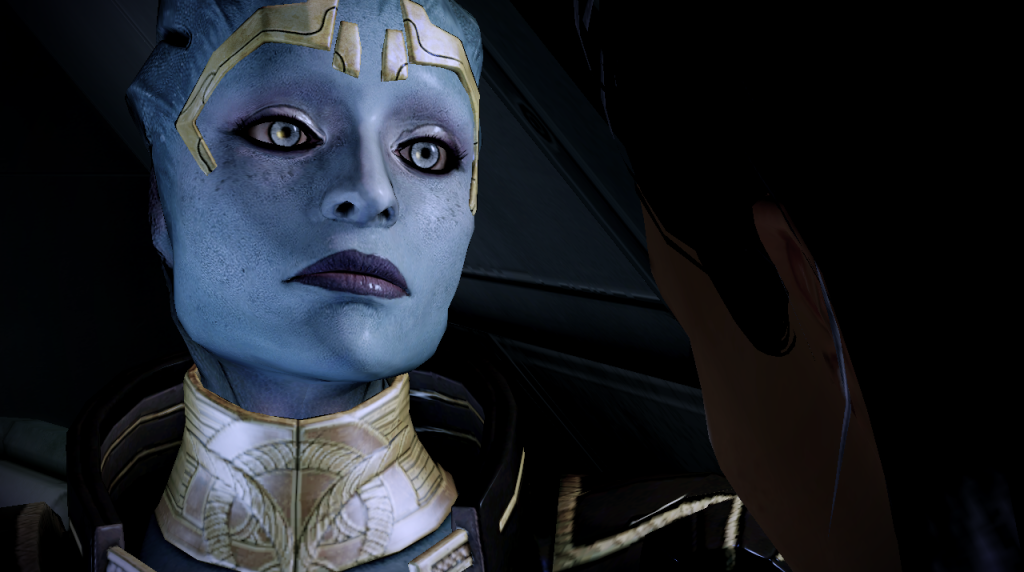In a conversation about storytelling in video games, it’s impossible not to bring up Bioware’s Mass Effect series. The three games in the series are known for their in-depth stories, culturally diverse universe, and a plethora of ethical and philosophical issues such as eugenics, genocide, and the humanity of artificial intelligence. These issues of philosophy and difficult choices made by the player character, Commander Shepard, are prevalent throughout the series, but one recurring story element is often overlooked: the role of motherhood.
The Mass Effect universe is home to many unique alien races, each with their own religions, cultures, and histories. As the first species to achieve space travel, the Asari lead the galaxy’s multi-race alliance. The Asari are one of the most culturally unique of these fictional species because they can live to be 1,000 years old and have very little concept of gender. The Asari are all biologically the same sex, and have a feminine appearance.
Their long lifespan is separated into three phases: the maiden, the matron, and the matriarch. While the maiden stage is focused on maturing and traveling, the matron stage is usually focused on having children, and in the matriarch stage the Asari typically becomes a leader in their community (some may even say they become a mother to their community). The connection that the matriarch stage has with wisdom and leadership suggests that the Asari believe mothers themselves often possess similar traits.
Motherhood is also explored through specific characters that Shepard meets. Liara T’Soni is a young Asari who joins Shepard’s crew in the first game and is a recurring character through the entire series. In the first game, they are forced to fight Liara’s estranged mother who has uncharacteristically engaged in suspicious activities that are later revealed to be evil in nature. Upon her defeat, her mother reveals that she is being mind controlled, and is able to break through it just long enough to tell Liara that she is proud of her one last time. In the end, Liara chooses to remember her as the mother who always loved her.
Mother-daughter storylines and relationships like this are rare to popular media, let alone video games, which usually represent moms as overbearing or crazy, such as Dr. Tenenbaum in the Bioshock series or Flemeth in Dragon Age: Origins. The good, caring moms typically sacrifice themselves for their child or have little to no bearing on the plot at all and aren’t even seen outside of the beginning of the game. The Mass Effect series subverts these tropes by creating mother characters who change the story in interesting ways. While at first it doesn’t seem like Liara’s relationship with her mother is anything out of the ordinary, it actually shows how strong mothers can be and how it affects those around them. Even long after her mother’s death, Liara still thinks of her mother in a positive light, remembering her fondly.
The bonds between mother and daughter are further examined through the character Samara, an Asari who joins Shepard’s crew in the second Mass Effect game. Samara, in her matron phase of life, has dedicated her life to finding and stopping her daughter Morinth, who has a rare disease causing her to become basically a succubus, seducing and killing sexual partners in order to gain power. When Samara decided to go after Morinth, she took up the code of the Justicar, the Asari equivalent of a samurai or medieval knight. She gave up all her worldly possessions to travel the galaxy protecting innocent people from harm at any cost; she needs to kill her daughter to protect innocent people. When Samara does finally kill Morinth, she reflects on her daughter’s intelligence and bravery despite her monstrous behavior.
Samara’s two other daughters also have this disease but chose to live in isolation so they couldn’t hurt anyone. In Mass Effect 3, the monastery where they are housed is destroyed, killing one daughter and leaving the other homeless. Believing this means that she will be free to kill indiscriminately, Samara concludes that either her last remaining daughter must be killed or she must kill herself. Despite not seeing her daughters in years, and believing them to be monsters of a sort, she still decides that killing herself is the better option. Even though the player can prevent her from going through with it (if they’re quick enough), Samara’s bond with her children remains stronger than her adherence to the code that she devoted her life to.
The motherly relationships in Mass Effect are all based on the idea that a maternal bond can trump difficult situations. While the relationships in Mass Effect are obviously extreme examples, it is accurate in its portrayal of just how different or complicated these relationships can be. No one’s relationship with their mother is the same as someone else’s, and Mass Effect recognizes that through characters like Samara.
When the role of mothers is tossed aside in so many stories, it’s especially refreshing to play a game where moms are more than just death fodder. They are strong, prominent, and complex, as they should be.
Joel Wallick is currently pursuing a degree in film studies at Bowling Green State University with an undecided minor. He has been gaming since early childhood, beginning with Pokemon Silver.






